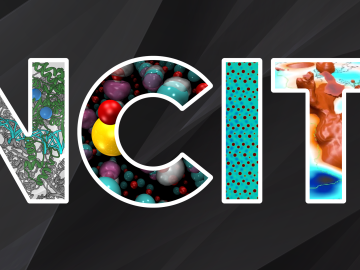
Filter News
Area of Research
- (-) Nuclear Science and Technology (40)
- (-) Supercomputing (82)
- Advanced Manufacturing (8)
- Biology and Environment (59)
- Biology and Soft Matter (1)
- Building Technologies (3)
- Computational Biology (1)
- Computational Engineering (1)
- Computer Science (3)
- Electricity and Smart Grid (3)
- Energy Frontier Research Centers (1)
- Energy Science (186)
- Fuel Cycle Science and Technology (1)
- Functional Materials for Energy (2)
- Fusion and Fission (30)
- Fusion Energy (14)
- Isotope Development and Production (1)
- Isotopes (7)
- Materials (152)
- Materials Characterization (2)
- Materials for Computing (20)
- Materials Under Extremes (1)
- Mathematics (1)
- National Security (24)
- Neutron Science (126)
- Nuclear Systems Modeling, Simulation and Validation (2)
- Quantum information Science (2)
- Sensors and Controls (1)
- Transportation Systems (2)
News Topics
- (-) Advanced Reactors (12)
- (-) Buildings (4)
- (-) Frontier (32)
- (-) Grid (5)
- (-) Materials (15)
- (-) Nanotechnology (11)
- (-) Neutron Science (17)
- (-) Nuclear Energy (39)
- (-) Transportation (6)
- 3-D Printing/Advanced Manufacturing (8)
- Artificial Intelligence (37)
- Big Data (22)
- Bioenergy (9)
- Biology (11)
- Biomedical (19)
- Biotechnology (2)
- Chemical Sciences (5)
- Computer Science (97)
- Coronavirus (14)
- Critical Materials (3)
- Cybersecurity (9)
- Energy Storage (8)
- Environment (23)
- Exascale Computing (26)
- Fusion (9)
- High-Performance Computing (43)
- Isotopes (7)
- Machine Learning (15)
- Materials Science (19)
- Mathematics (2)
- Microscopy (7)
- Molten Salt (5)
- National Security (8)
- Partnerships (1)
- Physics (10)
- Polymers (2)
- Quantum Computing (20)
- Quantum Science (25)
- Security (6)
- Simulation (16)
- Software (1)
- Space Exploration (8)
- Summit (43)
Media Contacts

Neuromorphic devices — which emulate the decision-making processes of the human brain — show great promise for solving pressing scientific problems, but building physical systems to realize this potential presents researchers with a significant

A world-leading researcher in solid electrolytes and sophisticated electron microscopy methods received Oak Ridge National Laboratory’s top science honor today for her work in developing new materials for batteries. The announcement was made during a livestreamed Director’s Awards event hosted by ORNL Director Thomas Zacharia.

The U.S. Department of Energy’s Office of Science announced allocations of supercomputer access to 51 high-impact computational science projects for 2022 through its Innovative and Novel Computational Impact on Theory and Experiment, or INCITE, program.

A team led by the U.S. Department of Energy’s Oak Ridge National Laboratory demonstrated the viability of a “quantum entanglement witness” capable of proving the presence of entanglement between magnetic particles, or spins, in a quantum material.

The daily traffic congestion along the streets and interstate lanes of Chattanooga could be headed the way of the horse and buggy with help from ORNL researchers.

An international problem like climate change needs solutions that cross boundaries, both on maps and among disciplines. Oak Ridge National Laboratory computational scientist Deeksha Rastogi embodies that approach.

An ORNL-led team comprising researchers from multiple DOE national laboratories is using artificial intelligence and computational screening techniques – in combination with experimental validation – to identify and design five promising drug therapy approaches to target the SARS-CoV-2 virus.

Oak Ridge National Laboratory expertise in fission and fusion has come together to form a new collaboration, the Fusion Energy Reactor Models Integrator, or FERMI

At the Department of Energy’s Oak Ridge National Laboratory, scientists use artificial intelligence, or AI, to accelerate the discovery and development of materials for energy and information technologies.

The U.S. Department of Energy’s Innovative and Novel Computational Impact on Theory and Experiment, or INCITE, program is seeking proposals for high-impact, computationally intensive research campaigns in a broad array of science, engineering and computer science domains.


